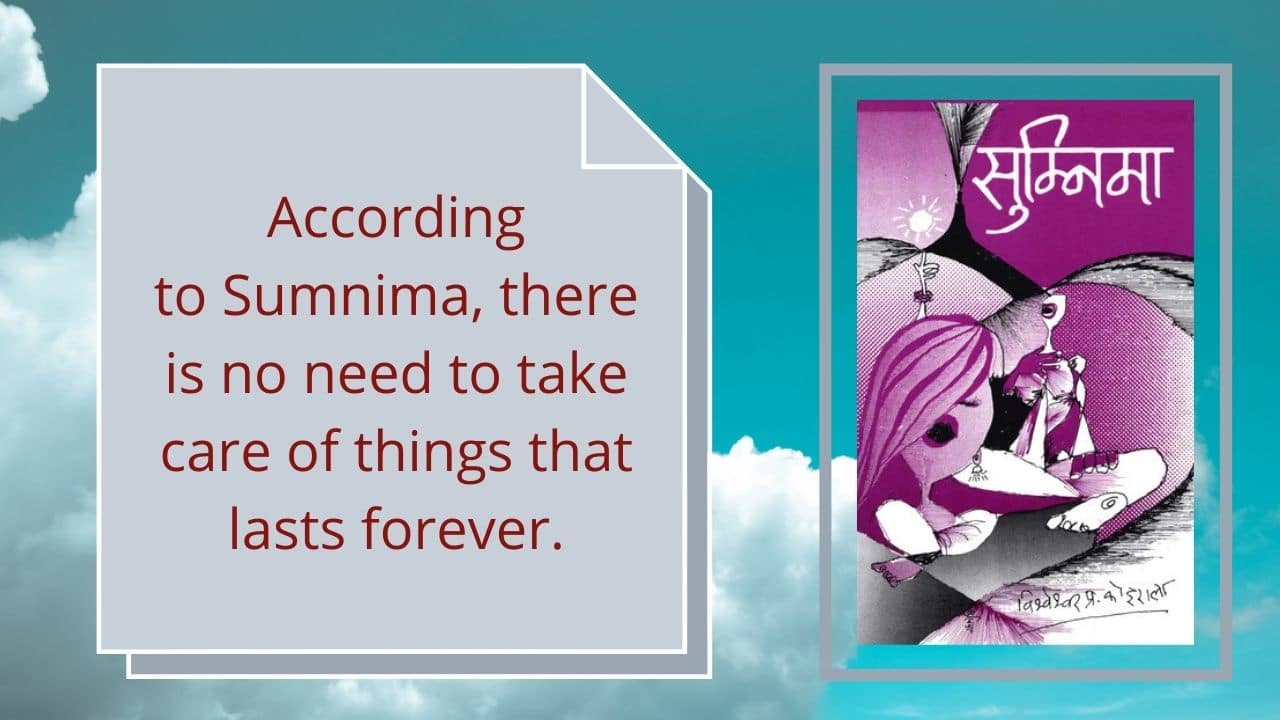
BP Koirala’s Sumnima: An Iconic Story to Read

SUJIN BASNET
Nov 2, 2020
Readers will be left with questions about their very own individual norms, values, belief, emotions, and the thoughts they pursue.
Sumnima is a novella by Bishweshwar Prasad Koirala who first introduced sexual psychology in Nepali literature.
A political firebrand and a literary genius Koirala wrote many bohemian stories and novels. His famous works include Modi Aaina, Teen Ghumti, Narendra Dai, Hitler Ra Yuhudi, and Doshi Chasma.
It is supposed that Koirala’s literary career was overshadowed by his political achievements. He explores human psychology, love, and sexual drives that rule human life.
Sumnima, 1964, was written in the span of 8 days while the author was prisoned in Sundarijal, a place near the capital city of Kathmandu. Koirala, who is popularly known as BP, was inspired to write Sumnima upon hearing the debate of his two contemporaries on Hindu & Kirant cultures and civilizations while serving time in prison.
The book tells an interesting story of Somdutta and Sumnima who belong to different religions. Somdutta, a Brahmin boy, belongs to the Hindu culture. He is deeply spiritual. He worships the gods. He has extensive knowledge of religious philosophies from Vedas, Upanishads, and Hindus.
Highly devoted to religion, Somdutta considers the body as the trench of Sin, hence he practices celibacy. Strictly.
Sumnima is from a different religious community known as Kirant. She has her own fickleness. She is a nature lover. She is quite vocal about the foundation of society where patriarchy prevails which refuses to identify the motherhood in the very first place.
The young heroine is conscious of the desires of her body. She believes the body is temporary, which is why we need to take good care of it. According to her, there is no need to take care of things that lasts forever.
Time and again, she urges Somdutta to pursue her ideals and beliefs. Time passes. The couple develops intense chemistry. They also have sex. Somdutta finds his aim and focuses derailed and so he separates himself from Sumnima.
Upon receiving blessings from his parents, Somdutta leaves home and starts a strong penance to claim victory over lust. After years when he returns home, Sumnima is already married. Somdutta marries an educated Brahmin girl named Puloma to continue the clan as per the wish of his parents.
Their marriage has no purpose other than giving birth to a son. Through the character of Puloma, the author tends to show the reader that women must go through lots of suffering and pain in their married lives.
Sometimes their sacrifices, wisdom & achievements are not well acknowledged in a patriarchal society. In the end, Somdutta looks dissatisfied with his life. He regrets it because he was not able to express his feelings for Sumnima.
He realizes that he disregarded Sumnima’s sacrifices, hardships, devotion for him. He could not use his knowledge and education to the optimum level. He realizes religious conservatism has in fact led him to a life without happiness and satisfaction.
From the very beginning of the story, there is a clash between two philosophies i.e. materialism vs spiritualism. By giving more emphasis to Sumnima, the author tries to convince the reader that materialism prevails over the spiritual quest which confines the feelings, emotions, and desires of the individual.
After reading this book, readers will agree that the title of the book does justice to its story. They will be left with questions about their very own individual norms, values, belief, emotions, and the thoughts they pursue. Overall, Sumnima is a great and iconic story to read.



Was helpful.